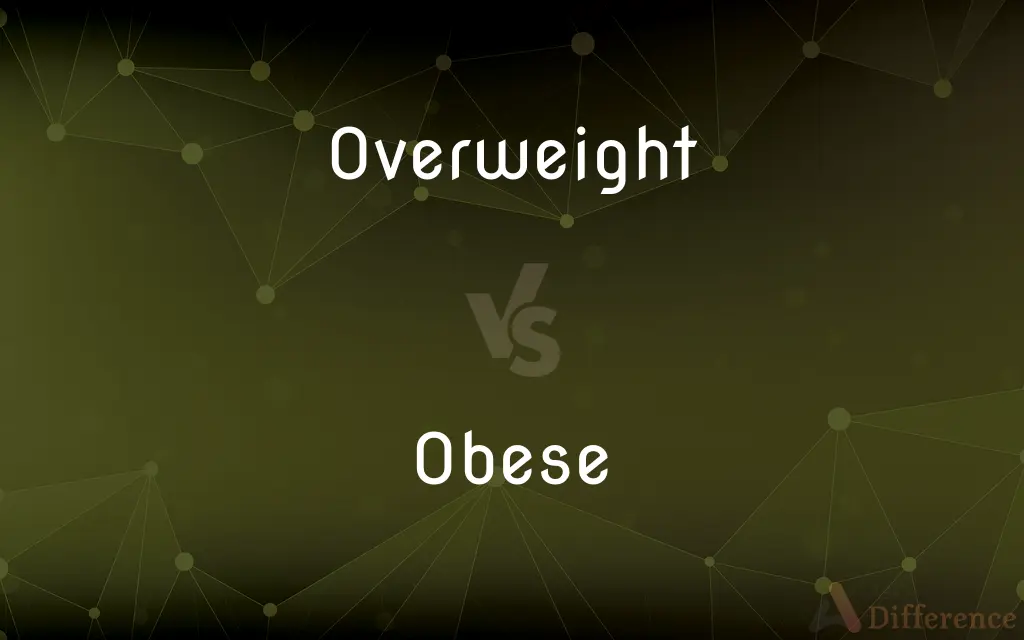Overweight vs. Obese — What's the Difference?
By Tayyaba Rehman & Urooj Arif — Published on February 15, 2024
Overweight is having more body weight than is considered normal or healthy for a certain height, often due to excess body fat and/or muscle mass. Obesity is a condition of having excess body fat to the extent that it may have a negative effect on health.

Difference Between Overweight and Obese
Table of Contents
ADVERTISEMENT
Key Differences
Overweight and obese are terms used to describe ranges of weight that are greater than what is generally considered healthy for a given height. The primary difference between being overweight and obese lies in the degree of excess body weight and the impact on health. Overweight is defined by having a Body Mass Index (BMI) of 25 to 29.9, indicating a weight more than what is considered healthy but less severe than obesity. Obesity is defined as having a BMI of 30 or higher, indicating a high amount of excess body fat in relation to lean body mass.
Both conditions are associated with an increased risk of various health issues, including heart disease, diabetes, high blood pressure, and certain cancers. However, the risk is greater with obesity due to the higher amount of excess fat. Managing overweight and obesity typically involves lifestyle changes such as diet and exercise, but treatment for obesity may also include medical interventions.
Overweight can sometimes result from increased muscle mass or other factors, not just excess fat. In contrast, obesity is specifically related to the accumulation of excess body fat. It's important to note that BMI, while a useful indicator of body fatness for the general population, does not directly measure body fat or account for muscle mass, age, gender, and racial differences.
Understanding the distinction between overweight and obese can help in assessing health risks and determining the most appropriate actions for improving health and well-being. Both conditions highlight the importance of maintaining a healthy weight through balanced nutrition and regular physical activity.
Comparison Chart
BMI Range
25 to 29.9
30 or higher
ADVERTISEMENT
Health Risks
Increased
Significantly increased
Cause
Excess body weight, possibly from fat or muscle
Excess body fat
Management
Lifestyle changes, diet, exercise
Lifestyle changes, diet, exercise, possibly medical intervention
Impact on Health
Moderate
Severe
Compare with Definitions
Overweight
Associated with increased health risks.
Overweight individuals may face higher blood pressure.
Obese
Poses a serious risk to health and longevity.
Obesity can significantly shorten life expectancy.
Overweight
A condition of weighing more than is considered normal for a height.
Being overweight can increase the risk of heart disease.
Obese
A higher degree of excess body weight, characterized by significant fat accumulation.
Obesity is linked to serious health conditions, including diabetes.
Overweight
Weighing more than is normal, necessary, or allowed, especially having more body weight than is considered normal or healthy for one's age or build.
Obese
Defined as having a BMI of 30 or above.
A BMI over 30 classified me as obese, prompting immediate lifestyle changes.
Overweight
More weight than is normal, necessary, or allowed.
Obese
Requires comprehensive management strategies.
Managing obesity may involve both dietary changes and medical treatments.
Overweight
Greater weight or importance; preponderance.
Obese
Often requires medical intervention beyond lifestyle changes.
In cases of severe obesity, surgery might be considered.
Overweight
To weigh down too heavily; overload.
Obese
Having excessive body weight caused by the accumulation of fat; extremely fat.
Overweight
To give too much emphasis, importance, or consideration to.
Obese
Extremely overweight, especially: weighing more than 20% (for men) or 25% (for women) over their conventionally ideal weight determined by height and build; or, having a body mass index over 30 kg/m2.
Overweight
(of a person) Having a higher weight, especially body fat, than what is generally considered healthy for a given body type and height.
Obese
A person who is obese.
Overweight
Weighing more than what is allowed for safety or legal commerce.
Obese
Excessively corpulent; fat; fleshy.
Overweight
Having a portfolio relatively heavily invested in.
Obese
Excessively fat;
A weighty man
Overweight
An excess of weight.
Overweight
The condition of being overweight.
Overweight
(countable) An overweight person.
Overweight
A security or class of securities in which one has a heavy concentration.
Apple common stock is one of our overweights.
Overweight
(transitive) To weigh down: to put too heavy a burden on.
Overweight
(transitive) To place excessive weight or emphasis on; to overestimate the importance of.
Overweight
Weight over and above what is required by law or custom.
Overweight
Superabundance of weight; preponderance.
Overweight
Overweighing; excessive.
Overweight
Having a weight in excess of what is normal, proper, or expected; as, the doctor recommends dieting to all his overweight patients; overweight luggage will incur an extra charge.
Overweight
The property of excessive fatness
Overweight
Usually describes a large person who is fat but has a large frame to carry it
Overweight
Often calculated using Body Mass Index (BMI).
My BMI indicates I'm overweight, so I'm adjusting my diet.
Overweight
Can result from excess body fat or muscle.
Athletes may be overweight due to muscle, not just fat.
Overweight
Managed through diet and exercise.
I'm tackling my overweight status with regular exercise.
Common Curiosities
Is being overweight always unhealthy?
Not always; factors like muscle mass and overall health also play a role.
Can you be obese and still be healthy?
Obesity generally increases health risks, but individual factors vary.
Is BMI the only way to measure obesity?
No, other measurements like waist circumference can also indicate risk.
How can obesity be treated?
Through a combination of diet, exercise, behavior changes, and possibly medication or surgery.
How do I know if I'm overweight or obese?
Calculating your BMI can provide a general indicator.
Does being overweight always lead to obesity?
Not always, but it can increase the risk without lifestyle changes.
What's the best way to reduce the risk of becoming obese?
Maintaining a balanced diet and regular exercise regimen.
Can genetics influence being overweight or obese?
Yes, genetics can play a role in one's propensity to gain weight.
Are the health risks the same for overweight and obese individuals?
No, obesity carries a higher risk for many health conditions.
Can children be overweight or obese?
Yes, and it's important to manage to prevent long-term health issues.
Does losing weight reduce health risks?
Yes, even modest weight loss can significantly reduce health risks.
How can overweight and obesity be prevented?
Through a healthy diet, regular physical activity, and monitoring weight.
Can diet alone solve obesity?
Diet is crucial but should be combined with physical activity and lifestyle changes.
Are there medications to treat obesity?
Yes, there are FDA-approved medications, but they require medical supervision.
Is surgery a viable option for obesity?
For severe cases, bariatric surgery might be considered.
Share Your Discovery

Previous Comparison
Nikon D5100 vs. Nikon D5200
Next Comparison
Euro vs. US DollarAuthor Spotlight
Written by
Tayyaba RehmanTayyaba Rehman is a distinguished writer, currently serving as a primary contributor to askdifference.com. As a researcher in semantics and etymology, Tayyaba's passion for the complexity of languages and their distinctions has found a perfect home on the platform. Tayyaba delves into the intricacies of language, distinguishing between commonly confused words and phrases, thereby providing clarity for readers worldwide.
Co-written by
Urooj ArifUrooj is a skilled content writer at Ask Difference, known for her exceptional ability to simplify complex topics into engaging and informative content. With a passion for research and a flair for clear, concise writing, she consistently delivers articles that resonate with our diverse audience.
















































